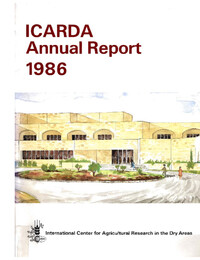ICARDA Annual Report 1986

Authors:
In 1986, ICARDA marked its tenth anniversary, a year of reflection and consolidation as well as new strategic directions. Stronger collaboration was established with countries such as Algeria, Ethiopia, Iraq, Morocco, Turkey, and China, with national research systems increasingly exchanging germplasm, information, and training. The benefits of ICARDA’s work were evident as several countries released or prepared to release new crop varieties derived from ICARDA germplasm. Training demand continued to grow, with ICARDA focusing on building national capacity while shifting its own efforts toward upstream and strategic research.
The center expanded its international outreach, engaging in research on faba bean and barley in China, barley in India and Latin America, and cooperative projects with Spain, Portugal, and the Soviet Union. A new proposal introduced practical and cost-effective biotechnological techniques to accelerate breeding and technology transfer. Another major initiative focused on high-elevation areas above 1,000 meters in Afghanistan, Algeria, Iran, Iraq, Morocco, Pakistan, Turkey, and Yemen, with plans for an international workshop in Turkey in 1987.
ICARDA’s new building complex at Tel Hadya neared completion, promising to bring together offices, laboratories, and support services under one roof, thereby improving efficiency. Weather during the 1985/86 season was more favorable than the previous year, with good rainfall during crop establishment, mild frosts, and overall better yields. This allowed ICARDA to produce large quantities of seed from promising cultivars for future research and distribution to national partners.
The decade of experience underscored that stress—drought, heat, cold, and diseases—remains the greatest constraint in dryland agriculture. ICARDA emphasized the development of stress-tolerant varieties and integrated technology packages aimed at sustaining production while conserving soil and water resources. Although national governments were showing increased interest in agricultural research, economic pressures, including falling oil prices, limited their ability to invest. Donor support was also under review, but ICARDA stressed that research in fragile ecosystems is complex and requires long-term commitment.
Finally, the 1986 Annual Report introduced a new format: detailed reports for scientific audiences alongside a broader annual report for policymakers and donors. This change aimed to improve communication while using resources more efficiently.
